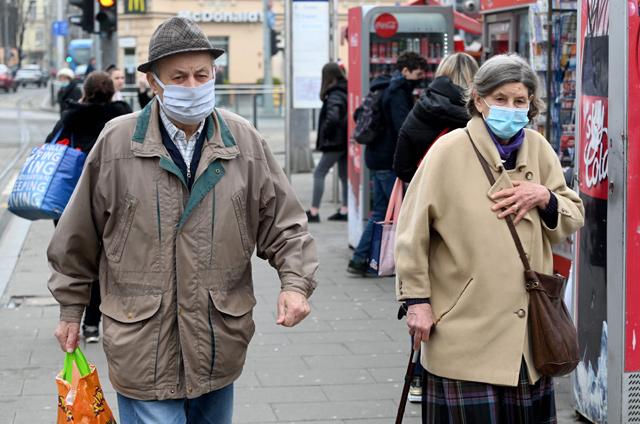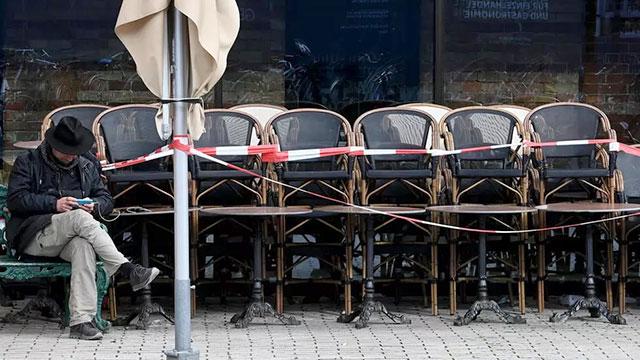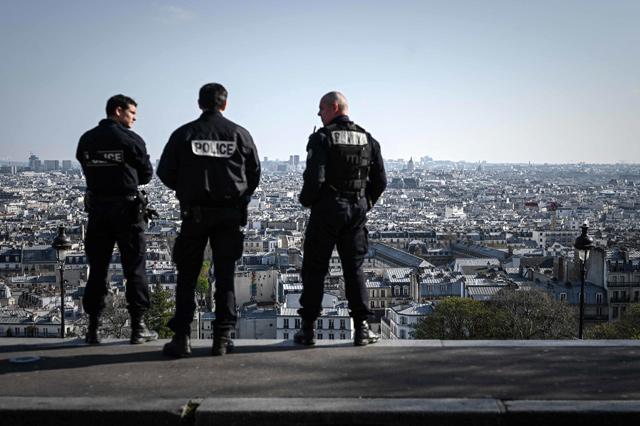You are here
WHO backs AstraZeneca as expert trades barbs with US
By AFP - Feb 10,2021 - Last updated at Feb 10,2021

Shoppers wearing protective face masks walk in downtown Zagreb on Wednesday (AFP photo)
GENEVA — The World Health Organisation (WHO) on Wednesday offered its backing to the coronavirus vaccine made by embattled drug company AstraZeneca, as one of its experts exchanged barbs with the US government over a controversial mission to probe the pandemic's origins in China.
The WHO said AstraZeneca's jabs could be used on people aged over 65 and also in places where new variants of COVID-19 are circulating, following recent questions over the efficacy of the British-Swedish firm's vaccine.
And there was further good news for AstraZeneca as the company announced it would work with German firm IDT Biologika to produce more vaccines for Europe, where shortages of doses have sparked a bitter dispute with the EU.
COVID-19 has killed more than 2.3 million people since emerging in China in late 2019, exerting a firm grip over people's lives across the world with lockdowns, curfews and business closures.
Germany looked set to prolong its restrictions as the European Union passed 500,000 deaths on Wednesday, with many EU countries struggling to get momentum behind their vaccine rollouts.
The EU's top official admitted in a public forum for the first time that the bloc had botched some aspects of its vaccine strategy.
“We were late to authorise. We were too optimistic when it came to massive production,” European Commission Chief Ursula von der Leyen told the European Parliament.
Even Russia, widely hailed for its homegrown Sputnik V jab, had only managed to fully vaccinate just over two million, two months into its programme.
Questions over the handling of the initial outbreak have meanwhile sparked an intense diplomatic row between Washington and Beijing.
A joint Chinese-WHO mission to the ground zero city of Wuhan wrapped up on Tuesday without any concrete answers, and US officials said they would not accept the findings before verification with their own intelligence.
The jibe prompted WHO team member Peter Daszak to tweet: “Please don’t rely too much on US intel: Increasingly disengaged under Trump & frankly wrong on many aspects.”
‘We are suffocating’
Hundreds of millions of people are still living under severe restrictions including curfews and full lockdowns, and many businesses are beginning to take a more strident tone with their governments.
“We are suffocating,” read a banner at a rally in Greece’s capital Athens, where hundreds of restaurant owners dropped their keys in a box to give to the government as a symbol of their despondency.
Greece, which has been under severe restrictions since late last year, will face an even tighter regime from Thursday as Prime Minister Kyriakos Mitsotakis warned of a third wave.
Peru on Tuesday began administering shots developed by China’s Sinopharm, while Argentina approved the Indian-made version of the AstraZeneca vaccine.
South Korea on Wednesday also authorised the AstraZeneca shot for people aged 18 and above, including over-65s.
Japan will start vaccinations next week — most likely the
Pfizer/BioNTech jab — but it is scrambling to secure suitable syringes so doses are not wasted.
AstraZeneca has faced a tough few weeks, with European leaders casting doubt on the efficacy of its jabs for over-65s and a small South African study suggesting it performed badly against their local strain.
Before Wednesday’s announcements from the WHO, South African officials said they were considering selling or swapping the jabs they had already bought, opting to stock up on another vaccine made by rival Johnson & Johnson.
“There are already countries who are asking to sell it to them,” said Health Minister Zweli Mkhize.
As vaccine rollouts rumble on, governments still face the thorny issue of persuading restless populations to abide by social-distancing rules — a particular problem this weekend when couples will look for a way to mark Valentine’s Day on Sunday.
Thailand’s capital Bangkok has banned people from getting married on the day, usually a popular time for weddings.
In Brussels, entrepreneurs are trying to enable some kind of celebration, with hotels converting rooms into private dining salons for two.
“We’re over the moon about being here tonight, just like in a restaurant,” said Marine Deroo, a 34-year-old who tried out the concept ahead of Valentine’s Day.
Related Articles
BERLIN — Doctors and public health officials pleaded with Germans on Thursday to take up AstraZeneca vaccines against the coronavirus after
BERLIN — German Chancellor Angela Merkel urged a "fair" distribution of coronavirus vaccines across the world on Tuesday, warning that the m
PARIS/LONDON — France, Poland and Ukraine introduced new lockdown measures Saturday to fight a surge in coronavirus infections, as the Europ



















